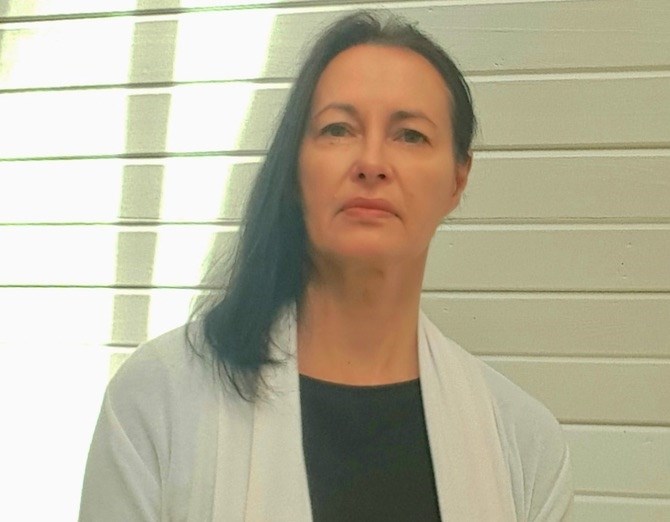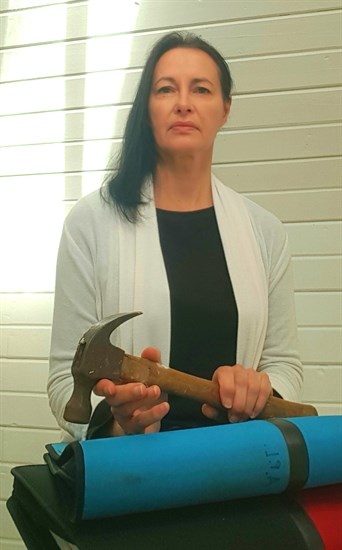
Darlene Mercer doesn't want to have to yell at her father in order for him to hear her. She just wants to be allowed to sit closer to him when they visit in his long term care home.
Image Credit: Submitted/Darlene Mercer
September 08, 2020 - 7:00 AM
All Darlene Mercer wants, for now, is to be able to sit a little closer to her nearly-deaf father on her weekly visits in his long term care home.
The Port Coquitlam home where he’s living makes her sit at the other end of an eight foot table in a common room when she visits so she has to yell in order for her father to hear her.
“Disturbing other people’s peaceful quiet visits, I don’t think is a good use of space,” she told iNFOnews.ca with a chuckle.
But it’s no laughing matter to her, or thousands of other family members who, first of all, were banned from visiting their loved ones at all because of the COVID-19 lockdown and now only have limited and very controlled visiting rights with relatives they’ve seen decline badly during their absence.
“Dad’s pretty deaf in one ear and has poor hearing in the other and he has some dementia so, like many seniors, he has problems processing what you’re saying,” Mercer said. “You have to go slow. You have to be very specific. You have enunciate well. You can’t just rattle something off from eight feet away and hope that they grasp it.
“Coming the other way, dad speaks very quietly now. He’s quite diminished. He mumbles a lot. You have to be within two to three feet to really hear him well and to be able to tease out how is he doing and figure out if he’s understanding what you just told him.”
He also lost about 10 pounds during her absence. Care home staff didn’t tell her about that because it was just under five per cent of his weight. Any loss greater than five per cent would have to be communicated, she said.
Mercer didn’t want to identify the care home where he’s living or his name because she’s negotiating in the hopes of being able to sit closer. So far, they’ve refused to budge, other than suggesting an unspecified hearing assistance tool.
“This is part of his emotional and mental well-being, which is provided for currently under the COVID regulations,” Mercer said. “They have no right, with these protections in place, to say through a glove that you can’t hold your senior’s hand, that you can’t brush their hair back, that you can’t pat them on the shoulder. These are really basic things.”
Because she has to wear a mask, she doesn’t know if her father fully recognizes her, especially being so far apart. And she can’t really discern how well he’s coping with his isolation from family.
“It’s one of the problems of wearing a mask,” Mercer said. “Is dad wondering: ‘Are you smiling? Are you really my daughter?’ I know he’s been confused and looking at me like I’m a space alien a couple of times.
“At the other end, you have to be in a position where you can really scrutinize your senior’s face and figure out, am I seeing recognition and understanding or am I seeing confusion?”
Before COVID-19, many family members spent a lot of time with their loved ones in their long term care homes. Staff appreciated the “vital role” families played in helping to feed and give emotional support and stimulation to residents, she said.
The lockdown has taken that away but not added staff to take on those tasks and the government doesn’t seem to care, she said.
“There’s a lot of challenges and, right now, I don’t think we’re addressing them,” Mercer said. “There’s a difference between common sense, an abundance of caution and having sensible measures in place and hauling up the drawbridge. You can’t replace family.”
She recalled an old Soviet experiment on the effect of depriving newborns of contact with their families.
“They soon found out there are psychological ramifications from taking away that emotional and physical bond with family,” Mercer said. “It’s like we’re repeating that experiment now with our seniors while they are on a very short timeline.”
And she knows something about how much time they have.
She visited a number of care homes looking for the right one for her father. She asked all of them how long residents tended to live and got a fairly consistent answer that 2.5 years was about average.
That’s backed up by a fact sheet in the B.C. Senior Advocate’s web page that says the average length of stay in residential care in 2016/17 was 871 days. That works out to 2.39 years.
Mercer did not want to provide a photo of her father to iNFOnews.ca for this story, but she did agree to send one of herself. She choose one that is very meaningful to her.

Image Credit: Submitted/Darlene Mercer
“The binders on my lap hold all the details of my father's personal life,” she wrote in the email accompanying the photo. “Every medical test, bit of correspondence, talks with LTC and hospital staff. The hammer is his and I wield it now. It reminds me of a man who single-handedly tore to the studs and rebuilt seven homes for his family, then one from scratch.
“It should remind all of us we fight for the right to hold more than the artifacts of their lives. They were builders, tradesmen, accountants, office workers, artists and professionals. We are their legal, moral and emotional representatives. We love them dearly and at a time at the end of their lives when all they deeply desire is to be with their family and at least hold their hands and feel their love the government denies this right.
“Who do we preserve them for this way? Under glass, remote from us in every meaningful way. Safe and dwindling.”
There is no sign that visitation rights are going to change any time soon in B.C. and each care home seems to have different rules on how family visits are done.
Senior Advocate Isobel Mackenzie is conducting a survey of people’s experiences with long term care during the pandemic but results of that won’t be released until the end of October.
READ MORE: Seniors' lives depend on changing COVID lockdowns in B.C. care homes: Seniors advocate
In the meantime, families struggle not only with what they see as the premature decline of their loved ones but the stress they’re trying to cope with themselves.
“I spend lots of weepy moments at home trying to figure out what I can do for dad so I can see him more so he’s not frightened of me,” Mercer said. “I saw his health decline dramatically because I was getting bad information.”
Not only was she not told about his weight loss, but she wasn’t told about essential visitor rules that would have allowed her to see him weeks earlier, or about the possibility of things like window visits.
There should be minimum requirements about the way care homes communicate with families and inform them of their options and encourage as much contact as possible, she argued.
“Some of these guys are not working with families,” Mercer said “They’re not recognizing how important family is and what essential really means. And neither is the ministry. It’s not to anybody’s benefit.
“Seniors are going to die, needlessly ahead of time, because of it.”
To contact a reporter for this story, email Rob Munro or call 250-808-0143 or email the editor. You can also submit photos, videos or news tips to the newsroom and be entered to win a monthly prize draw.
We welcome your comments and opinions on our stories but play nice. We won't censor or delete comments unless they contain off-topic statements or links, unnecessary vulgarity, false facts, spam or obviously fake profiles. If you have any concerns about what you see in comments, email the editor in the link above.
News from © iNFOnews, 2020